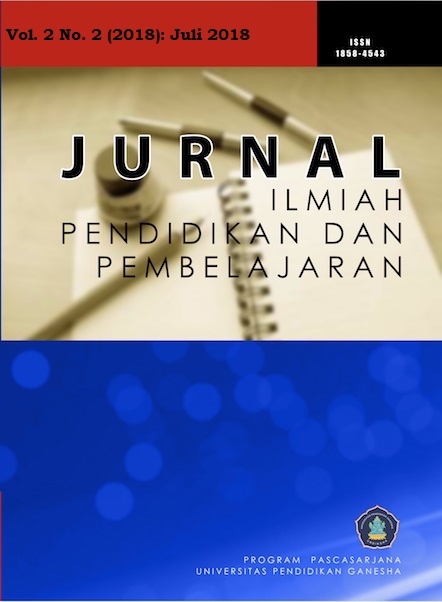PENGARUH MODEL TALKING STICK TERHADAP HASIL BELAJAR PKn PADA SISWA KELAS V SEMESTER II SD DI GUGUS I KECAMATAN GEROKGAK
DOI:
https://doi.org/10.23887/jipp.v2i2.15405Abstract
This study aims to find out the significant differences in learning outcomes of Civics among students who were taught by the Talking Stick model and students who were taught by conventional learning in grade V students of second semester of elementary school in Gugus I of Gerokgak Subdistrict. This research is a quasi-experimental research with post test only control group design design. The population of this study is the entire class V SD in the first group of Gerokgak District with a total of 126 students. The sample was taken by random sampling technique so that it was obtained by grade V SD Negeri 3 Tukadsumaga as experiment group and class V SD Negeri 1 Tukadsumaga as control group. The instrument of data collection used in this research is objective test of Civic learning result. Data were analyzed using descriptive statistics and Independent sample t-test. The results showed that there were significant differences in the learning outcomes of Civics between students studying with the Talking Stick model and students who were taught by conventional learning. The magnitude of t_hcount is 3,048, while t_tabel at 5% significance level and db = 42 is 2.021. This means t_count> t_table. In addition, the average score of Civics learning outcomes of students who studied with the Talking Stick model (23.08) was higher than that of students taught by conventional learning (19,26). Thus, Talking Stick model model influences the learning outcomes of Civics in Grade V students of Grade II in Gugus I, Gerokgak Sub District, Lesson Year 2017/2018. Suggestions for further research are expected to result in this research can be reused in other lessons.
Keywords: talking stick, Civic learning outcomes
References
Anggarini, D. 2013. "Pengaruh Model Pebelajaran Kooperatif Talking Stick Berbasis Aneka Sumber Terhadap Hasil Belajar Ips Siswa Kelas V Sd Negeri 5Dalung". Tersedia pada https://ejournal.undiksha.ac.id/index.php/JJPGSD/article/view/1440/1301 (diakses tanggal 8 Januari 2018).
Darmawati, A. 2013. “Pengaruh Model Pembelajaran Children Learning In Science Berbantuan Metode Talking Stick TerhadapSikap Ilmiah Dan Penguasaan Konsep IPA Kelas V”. Tersedia pada https://ejournal.undiksha.ac.id/index.php/JJPGSD/article/view/789 (diakses tanggal 4 Juni 2018).
Depdiknas. 2003. Undang-Undang No. 20 Tahun 2003 tentang Sistem Pendidikan Nasional, Jakarta: Depdiknas.
Partini, Kd. 2013. Pengaruh Model Pembelajaran Terpadu Connected Terhadap Hasil Belajar PKn Siswa Kelas IVSd N 28 Dangin Puri.Tersedia pada https://ejournal.undiksha.ac.id/index.php/JJPGSD/article/view/775 (diakses tanggal 04 Juni 2018).
Pradnyani, D. 2013. Pengaruh Penerapan Model Pembelajaran Kooperatif Tipe Talking Stick Terhadap Hasil Belajar Ips Siswa Kelas 4 Sdn 2 Sesetan Denpasar. Tersedia pada https://ejournal.undiksha.ac.id/index.php/JJPGSD/article/view/957/827 (diakses tanggal 8 Januari 2018).
Puspitasari. Eka. 2013. Pengaruh Strategi Pembelajaran Pq4r Dan Motivasi Belajar Terhadap Hasil Belajar PKn Siswa Kelas IV SD Gugus 2 Tampaksiring. Tersedia pada https://ejournal.undiksha.ac.id/index.php/JJPGSD/article/view/1193 (diakses tanggal 4 Juni 2018).
Shoimin. Aris. 2014. 68 Model Pembelajaran Inovatif dalam Kurikulum 2013. Yogyakarta: Ar-Ruzz Media.
Rasana, Raka. 2009. Model-Model Pembelajaran. Singaraja: Undiksha.
Valentina. F. 2013. “Pengaruh Model Pembelajaran Time Token ArendsTerhadap Hasil Belajar Pkn Siswa Kelas V SD Gugus Ii Kecamatan Seririt”. Tersedia pada https://ejournal.undiksha.ac.id/index.php/JJPGSD/article/view/835 (diakses tanggal 9 Januari 2018).
Downloads
Published
How to Cite
Issue
Section
License
Authors who publish with the Jurnal Ilmiah Pendidikan dan Pembelajaran (JIPP) agree to the following terms:
- Authors retain copyright and grant the journal the right of first publication with the work simultaneously licensed under a Creative Commons Attribution License (CC BY-SA 4.0) that allows others to share the work with an acknowledgment of the work's authorship and initial publication in this journal.
- Authors are able to enter into separate, additional contractual arrangements for the non-exclusive distribution of the journal's published version of the work (e.g., post it to an institutional repository or publish it in a book), with an acknowledgment of its initial publication in this journal.
- Authors are permitted and encouraged to post their work online (e.g., in institutional repositories or on their website) prior to and during the submission process, as it can lead to productive exchanges, as well as earlier and greater citation of published work. (See The Effect of Open Access)










